Diversity is one of the ingredients of a strong backlink profile.
Essentially, you must build different types of backlinks.
In the article, you will discover 11 backlink types you should include in every link-building strategy. I will also show you three types to avoid and wrap up with answers to a few frequently asked questions about link types.
11 Types of Backlinks You Absolutely Must Build
Without wasting your time, let me take you through the list of 11 backlink types you must build for your clients.
1. Editorial backlinks
Editorial links are backlinks that the writer or editor includes in their article to add value.
Here's an example of such a link to one of our articles in a Venngage (DR85) blog post about using infographics for local SEO.
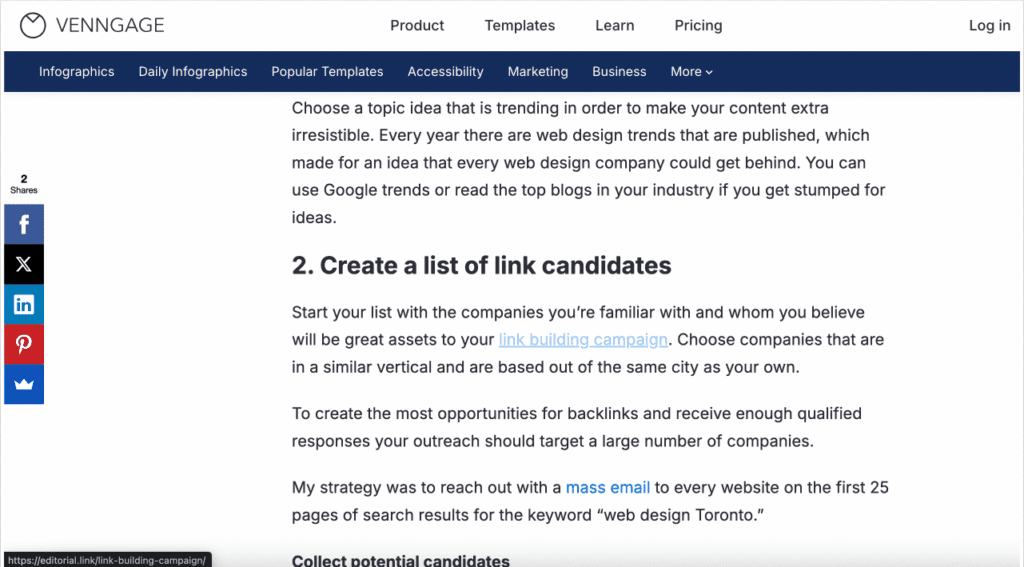
And here's one Surfer (DR81) kindly placed into their article about off-page SEO tips:
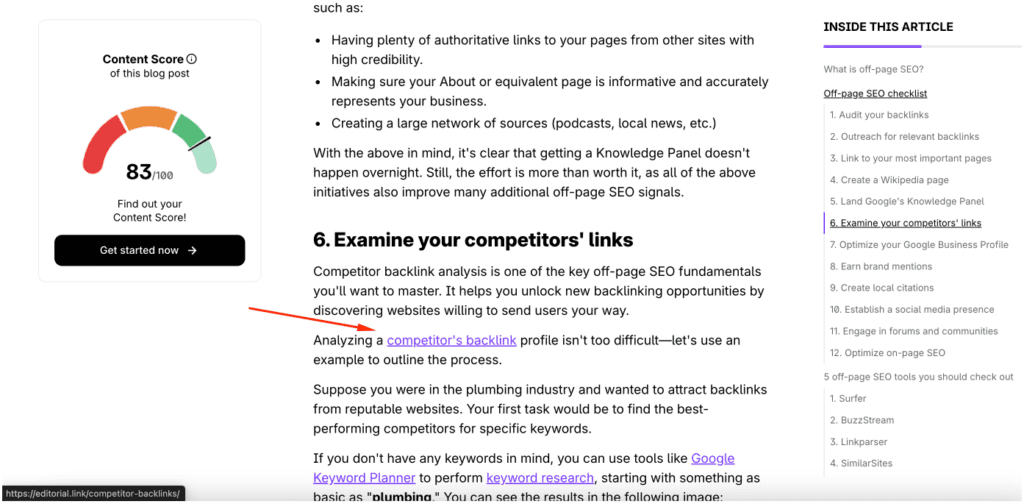
This happens either at the writing/editing stage or later: you can approach them once the article is published and ask them to link to your page. That's why we often call them link insertions.
If the link is inserted into an existing article that already ranks and has organic traffic, it starts passing PageRank immediately.
For this to happen, you need to create content worth linking to and promote it via outreach or social media. To make it easy for editors to find it.
If you'd like editorial links like the ones above, get in touch with our team. There's a good reason why our company is called Editorial.Link.
2. PR backlinks
Many SEO experts believe digital PR is the most effective link-building tactic.
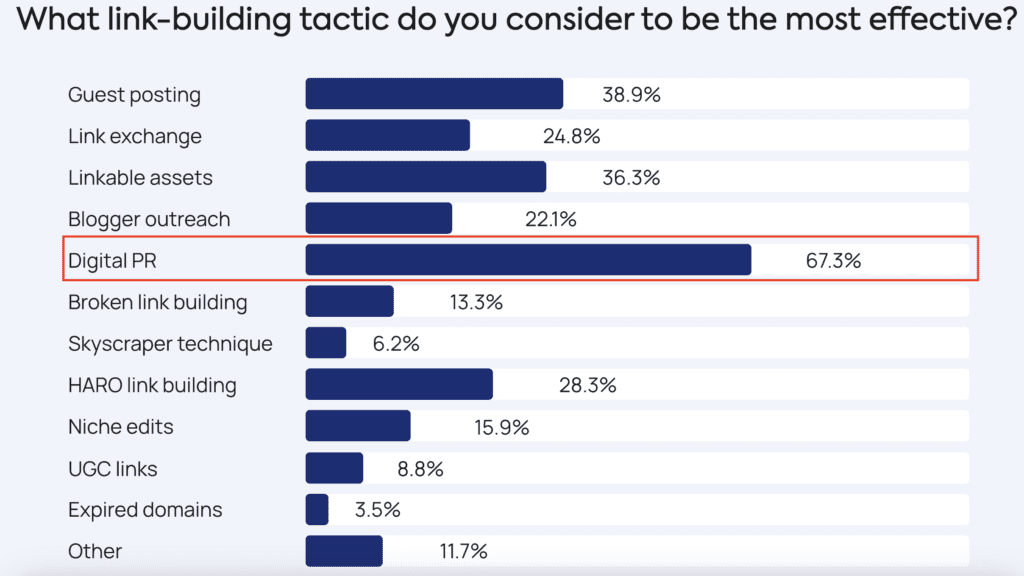
The reason? A single campaign can fetch a number of high-quality backlinks from major news outlets.
For example, JBH campaigns secured over 205 backlinks with an average DR69 for a chain of dental practices. This included links in Newsweek (DR91), The Mirror (DR90), and The i Paper (DR85).
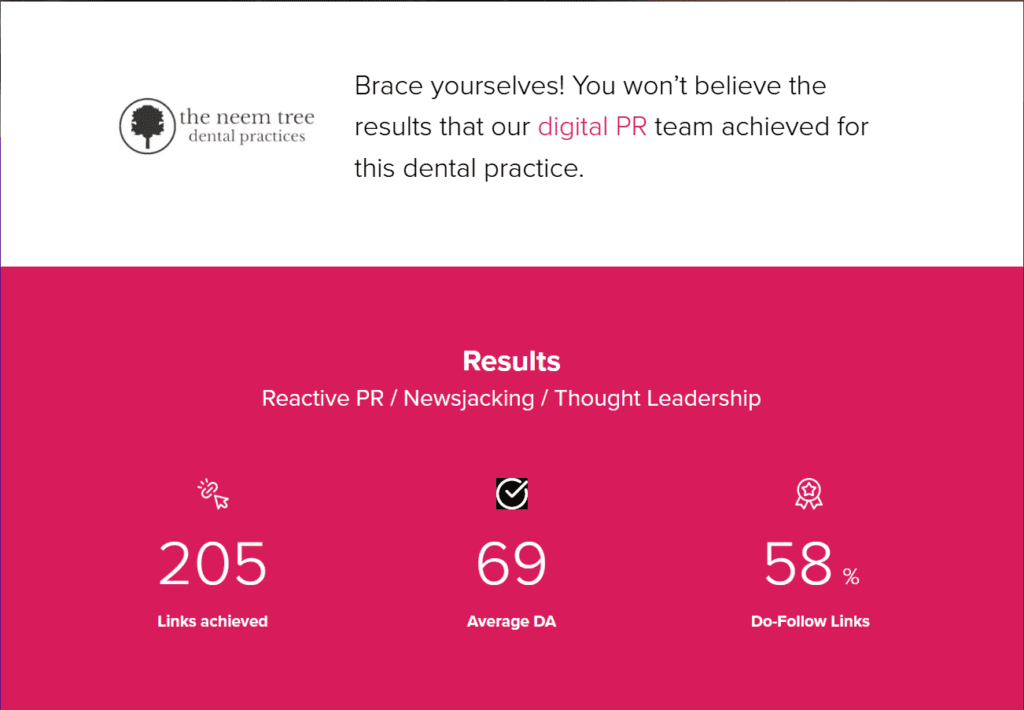
On paper, this strategy is straightforward: You create a newsworthy story and pitch it to journalists covering the niche. But as always, the devil's in the details.
The competition is high, so your content needs to offer unique data or tell an engaging story to stand out.
Here are a few tactics you can try:
- Newsjacking/Reactive PR: Respond to the latest events and trending news stories.
- Thought-leadership: Comment on industry topics and trends, leveraging your internal expertise.
- Product PR: Distribute press releases about major product updates and invite journalists to new product launches.
- Creative campaigns: Capture the media attention with original campaigns, like the /OutHourse_ <Your_Email> campaign by Visit Iceland.
Apart from captivating stories, you also need access to the journos. Tools like Prowly, BuzzStream, or Muck Rack can help you reach the right people.
3. HARO backlinks
Although harder to scale than Digital PR, HARO link-building is another way to secure quality media links.
Never heard of HARO? How about Connectively? That's what the service was called after it was acquired by Cision and before it was closed in December 2024.
Fortunately, there are other HARO-like services connecting journalists with experts:
- Featured
- Qwoted
- SourceBottle
- Help a B2B Writer
- JustReachOut
They all work in the same way:
Journalists post their requests for SME contributions. You respond to the requests with comments and quotes, and if you get featured, you get a link to your site in exchange.
That's how I got this link from Keyword.com (DR70):
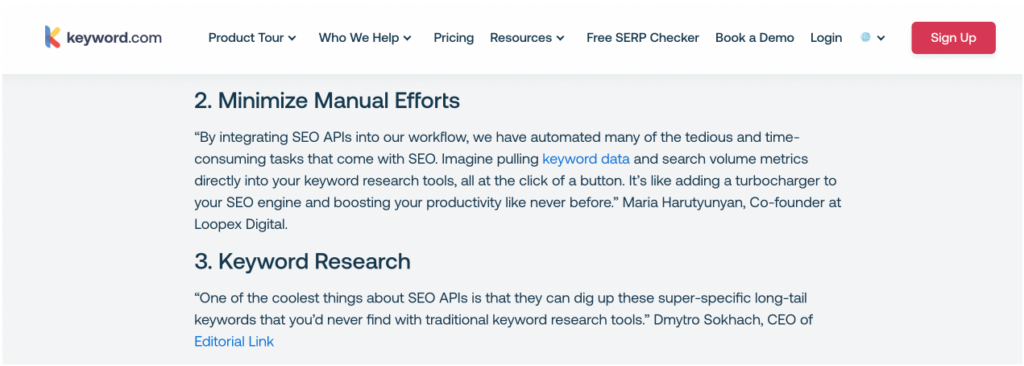
And here's one in SEOptimer (DR79):
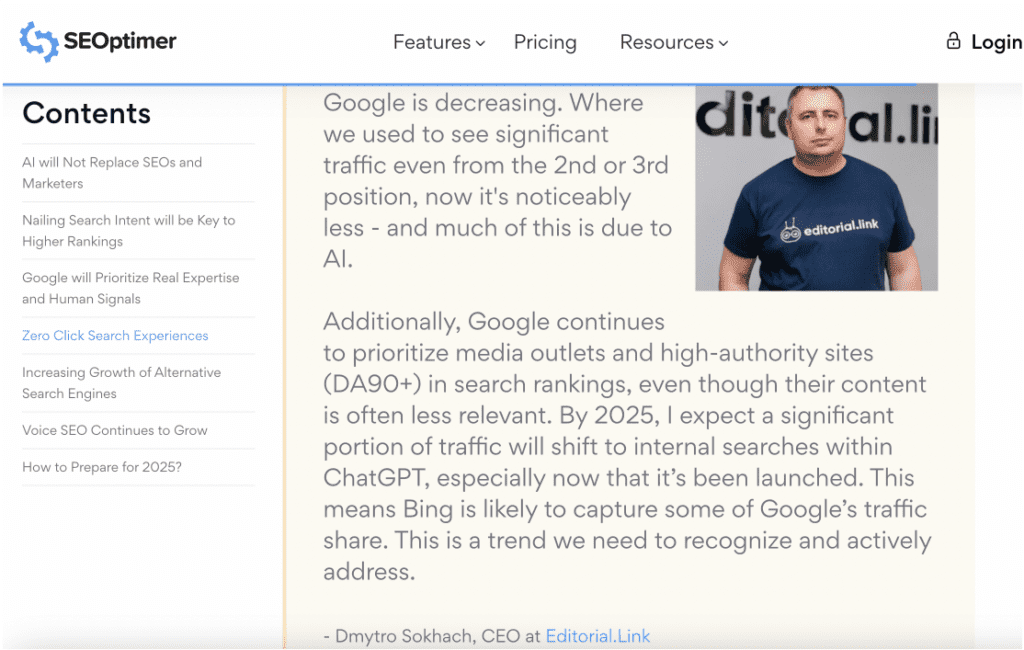
If you want to give HARO a shot, here are my tips:
- Don't use AI chatbots to craft your pitches. Otherwise, yours will be one of the dozens of identical pitches.
- Don't outsource pitching. Writers want insights from experts, not low-paid VAs.
- Offer unique insights and examples that the journalists can't find in SERPs. Show them why you consider yourself an expert!
4. Guest post backlinks
Guest posting is a staple of link-building. There are hundreds of blogs that accept guest contributions. They don't pay for them, but you can include a link to your website.
Here's an example of our guest post for Search Engine Land:
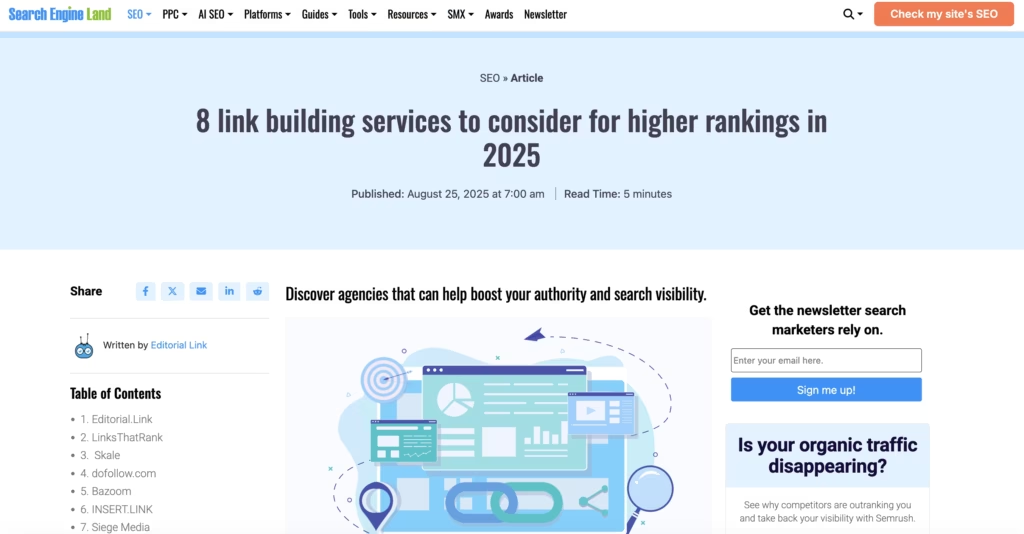
Sometimes, you even get more than one backlink, so you can exchange them for links from your partners or use them as tier 2 links.
Finding these opportunities is easy; just use one of the search operators:
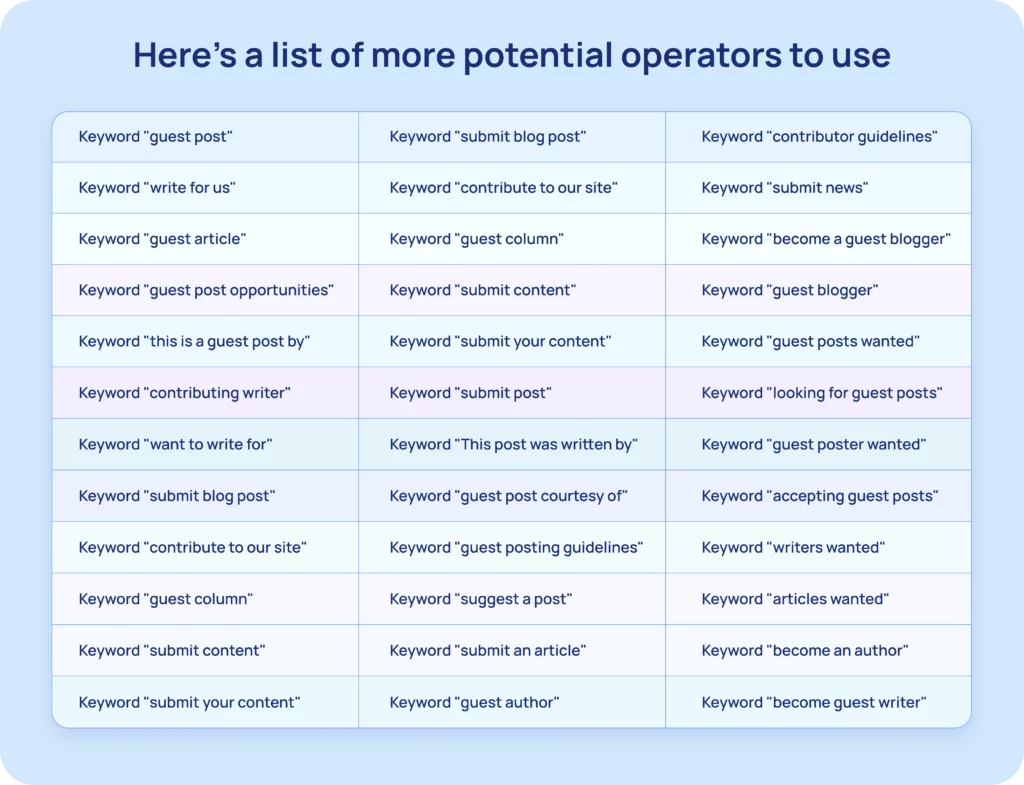
The difficulty is writing content that's unique, valuable, and meets editorial standards. Which are often super strict. And you never know if the story will be published at all, which makes it a time-consuming and expensive process.
That’s why many choose to work with guest posting providers who know the ropes and have the experience to get placements published.
💡Top tip: When pitching your stories, pick 3-5 topics they haven't covered in their blog or keywords they don't rank for (especially when their competitors do).
5. UGC backlinks
UGC stands for user-generated content. Think forum posts, blog comments, or online reviews.
Links in UGC come with the rel=”ugc” or rel=“nofollow” attribute, so their impact on SEO is limited.
But that's not what the UGC game is about!
Let me explain:
Unless you've lived under a rock for the last six months or so, you know how Reddit has dominated search engine rankings.
Here's an example of a SERP for 'product management tools.' You can see the Reddit thread sitting in the #4 spot, beating the likes of Aha (DR61), Productboard (DR79), Userpilot (DR76), and ClickUp (DR87).
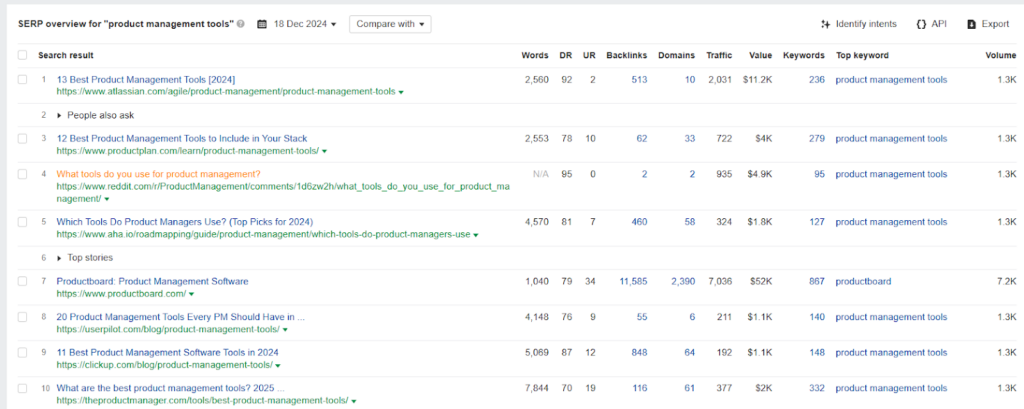
Here’s a similar pattern for the term “best link building services”:
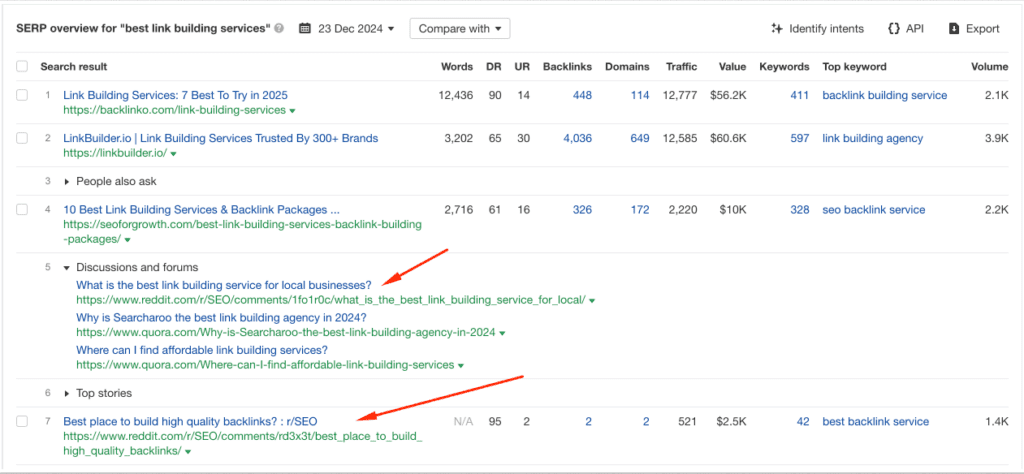
So, a comment featuring a link to your tool or service can increase your online exposure and drive lots of referral traffic to your site.
6. Social media backlinks
Social media backlinks can also come from user-generated content.
For example, your users can share their experiences with your product or service with their followers and include a backlink to your website. Or you can do it by sharing a blog post you've recently published.
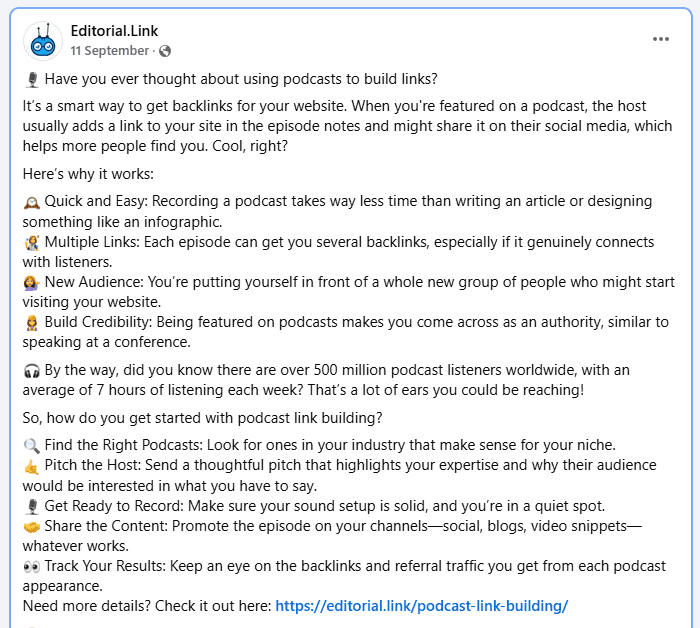
In addition, you can place the links to your content in the:
- About/Bio sections of your profiles
- Instagram/Facebook stories
- YouTube videos
7. Business directory backlinks
Directory backlinks offer similar benefits to UGC content: they don't pump any link juice to your website because they're usually nofollow, but they increase your online visibility and bring high-intent traffic.
For example, we've been getting a steady flow of inbound leads from our Clutch profile.
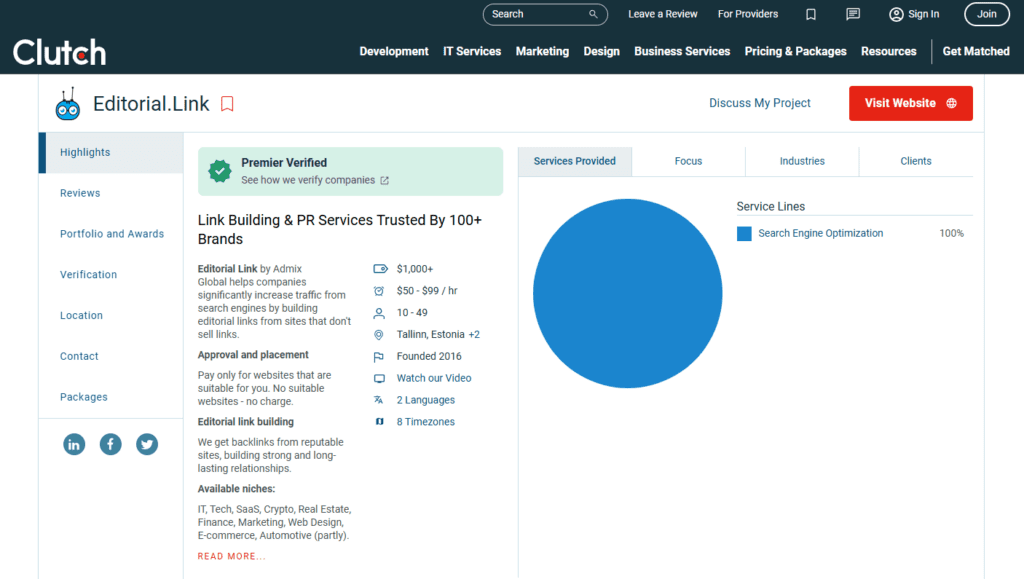
And these leads are easier and quicker to convert because they're already pre-warmed. They know what we offer and how much we charge, and they've seen the glowing reviews from our satisfied customers.
8. Listicle backlinks
Listicles are articles with curated lists of products or services with short descriptions, features, prices, and more.
Here's an example of a listicle featuring Editorial.Link in Search Engine Land.
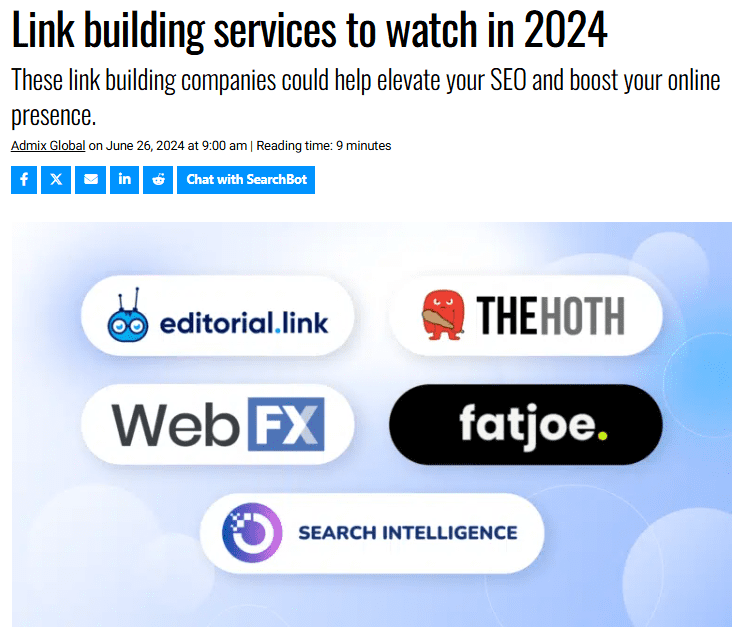
Getting listed in an article like this offers exceptional value. If the article ranks in the top 1-3 spots, it's like getting short-listed as a solution to the problem the reader is trying to solve.
This can drive thousands of visitors from search.
But wait—that's not all!
Listicles can help your business appear in Google's featured snippets, further increasing its online exposure.
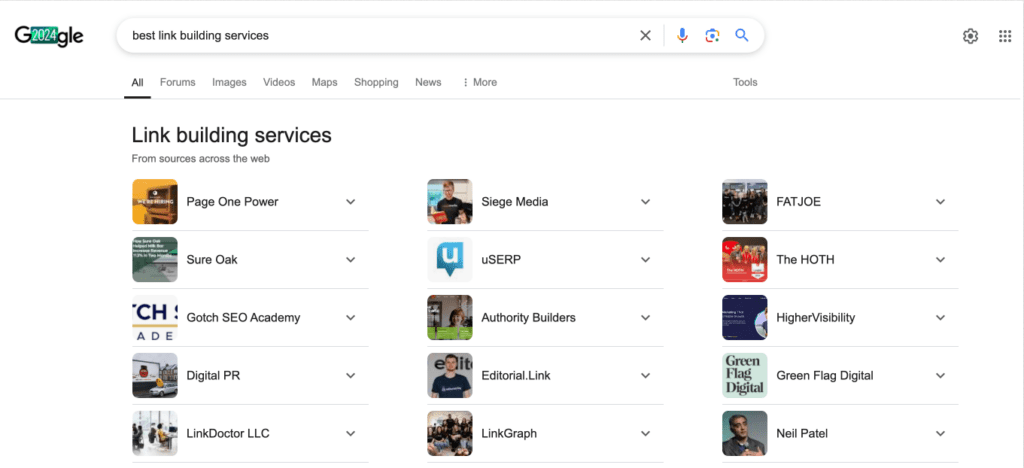
You have two ways to get featured in a listicle:
- Pitch to the website owners who published ranking listicles. However, in competitive niches like SEO or SaaS, these tend to be your competitors, so there’s no way you can get the link.
- Create your listicle and publish it on the 3rd party website as a guest post like the one above.
9. Resource page backlinks
Websites often have pages with resources their audiences will find useful, like this one in a blog for writers.
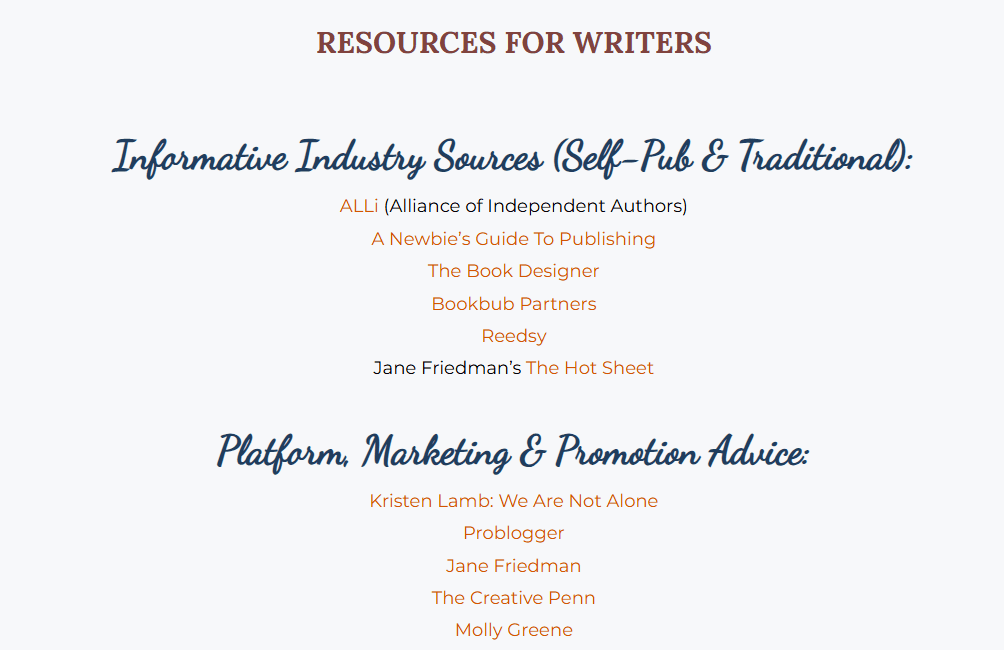
How do you find such resource pages? With advanced search operators:
- Keyword “helpful links"
- Keyword “best resources”
- Keyword” useful resources”
- Keyword intitle:links
- Keyword inurl:resources
For example, I found the web page above by searching for "writing inurl:resources."
The hard part?
Persuading the webmaster to link to include your resources on the page. Because they get flooded with similar requests.
10. Image backlinks
Image backlinks are links to visuals that you publish on your webpage.
That's how we got a backlink from Omniscent Digital, a content marketing agency, who used one of our infographics in their article about SaaS content marketing strategies.
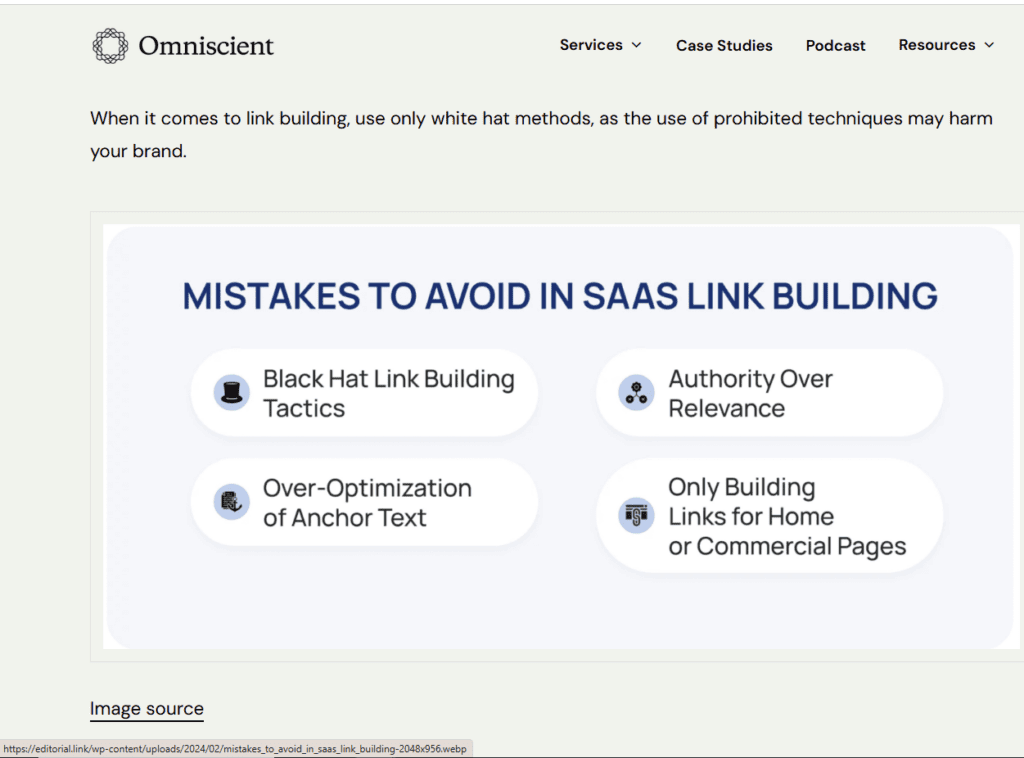
The main advantage of creating high-quality images is that they can help you earn backlinks organically.
Semrush has found that articles with visuals get more views and shares.
Moreover, if someone is looking for visuals, and your image is well-optimized for search (keywords in the alt text, file names, etc.), they're easier to find than written content because there are generally fewer of them.
However, to maximize their impact, you still need to promote them, for example, by sharing them with bloggers or editors who have published articles on related topics.
Better yet, research existing articles in your niche first and create bespoke visuals to enhance them.
11. Testimonial backlinks
As the name suggests, testimonial backlinks come from testimonials published by your client or customer on their website.
Here's a testimonial I provided to one of our content writers, and when he published it, he included a link to our another website homepage:
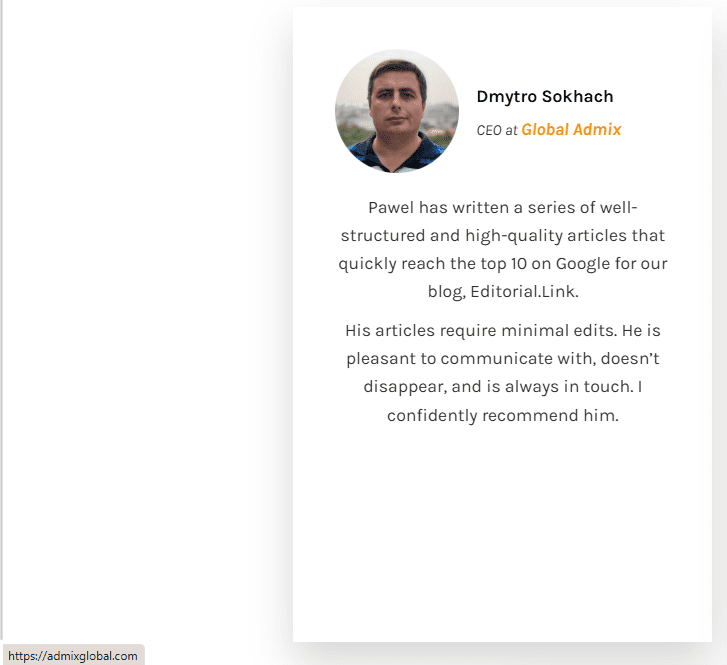
Testimonial backlinks are often an easy win because you already have a relationship with the website owner. And your testimonial provides social proof that can help them close more deals.
Types of Backlinks to Avoid
While links generally improve the SEO performance of your content, not all of them do.
Search engines ignore poor-quality paid links from spammy sources, and in extreme cases, they penalize websites that use them with lower rankings or even de-indexing.
Here are three types of backlinks to watch out for.
Link farm backlinks
Essentially, link farms are websites that sell links.
You can often recognize them by poor design and lack of focus—they feature content about every possible topic on Earth. These often include PPC. Porn, Pills and Casinos.
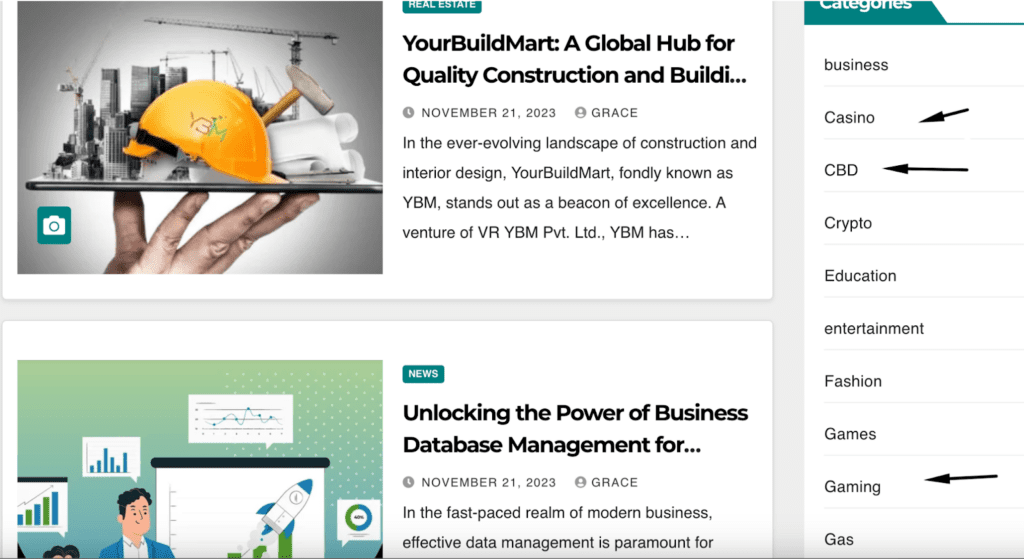
Other giveaway signs include low traffic and a high outbound-inbound link ratio (way higher than 4:1).
Link farm backlinks are dirt cheap—you can get 25-50 for $100 on Fiverr or Legiit.
Sounds like a bargain, right?
Wrong!
Links like that may give your website a short-term boost but not much more beyond that.
That's because they lack relevance, and they don’t stay live for long. We recently studied over 44k websites that actively sold links in 2023, and after a year, over 29% of them returned an error message.
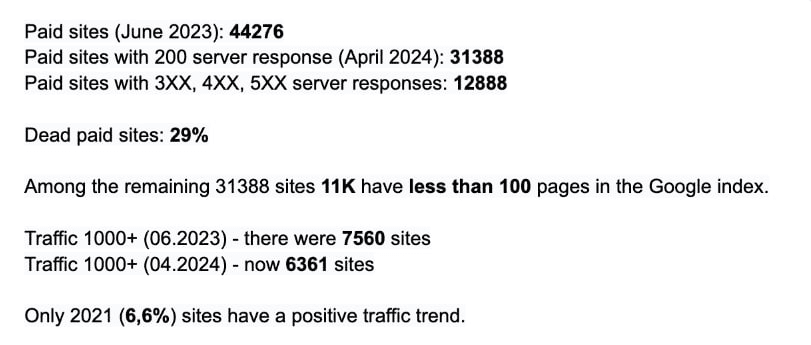
Note, however, that not all paid links are considered spammy, and not all websites that sell them are link farms. For example, all major media outlets sell sponsored backlinks placements. They don't violate Google guidelines because they come with the rel=sponsored attribute.
PBN backlinks
PBN backlinks are links from private website networks.
The Semrush Backlinks Network Graph shows how it looks: you can see multiple websites, often hidden from SEO tool crawlers, linking to one main site, which then links back to the money page.
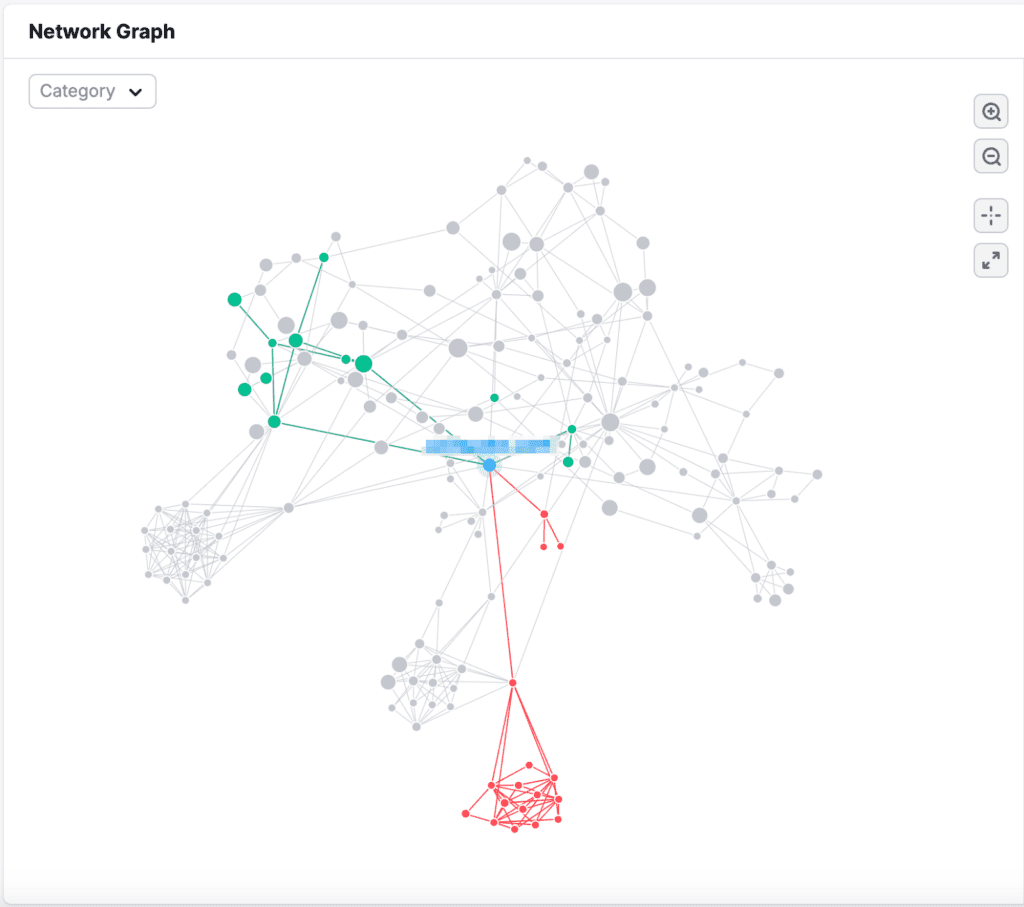
The websites offer no value to the audience – their main purpose is to provide links.
As such, PBNs are examples of link schemes used to manipulate search results, which Google has been cracking on since the Penguin update in 2012. So, the odds are that this type of link won't bring much SEO value.
Toxic backlinks
Google staff, including John Mueller himself, claimed for a long time there's nothing like a toxic backlink.

However, the Google API leak has revealed references to “BadBackLinks,” suggesting that spammy backlinks can hurt your SEO efforts.
What kinds of backlinks are we talking about?
- Hacked links
- Low-quality directory backlinks
- Press release backlinks
- Widget links
- Hidden links
FAQs About Type of Backlinks
To finish, let me answer a few frequently asked questions about SEO backlinks and their different types.
What is an SEO Backlink?
An SEO backlink is a hyperlink that connects one website to another.
Also called incoming or external links, backlinks signal to search engines that the content is reputable and trustworthy, improving its rankings.
Contrary to popular belief, you don't need to build thousands of backlinks to boost your SEO efforts as long as they are quality backlinks.
Backlinks also help search engine crawlers discover new content and bring referral traffic to your website.
What is the most powerful type of backlink?
These are the qualities of the most powerful links:
- Relevance. The content needs to be directly linked to your niche.
- High domain authority/domain rating (DA/DR). The closer to 100, the better.
- High organic traffic. The more people visit the site, the more referral traffic you can get.
- Low outbound link count. The more of them, the more diluted the link juice.
- Descriptive and relevant anchor text. This helps the crawlers understand what your content is about.
- Dofollow attribute. Nofollow backlinks are generally seen as less valuable because they don't pass PageRank.
Why is it important to build different types of backlinks?
There are two reasons why you should build links of various types.
First, a diverse backlink profile looks more natural. If you were to acquire backlinks organically only, you would have a mix of different kinds of links, not just listicle or editorial links.
Such a diversified link profile is also less vulnerable to algorithm updates. If you have one tactic that works very well, say guest posting, you may be tempted to over-rely on it. But what if Google suddenly decides all guest post links are meh? There's nothing to fall back on.
Final Words
Your SEO strategy shouldn't rely on one type of backlink. To build a diverse and naturally-looking backlink profile, you need different link types.
Not all links are worth the effort and money, and some can even be harmful.
Distinguishing between the right and wrong links and building quality links at scale requires experience, time, and access to a network of reputable sites.
If you'd like a link-building agency to take this off your plate, get in touch with the Editorial.Link team. We can help!

